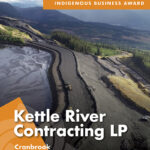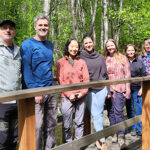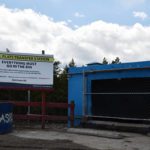Home »

Province now taking CRT to the people of the Basin
The provincial government has begun a consultation and fact-finding mission to help it focus and prepare for potential upcoming Columbia River Treaty (CRT) renegotiation by staging a series of open houses and discussion forums around the Columbia Basin.
The first consultation event took place May 29 at the Jaffray Community Hall.
More than 60 people took part in the open house, which included a free hamburger dinner, including a host of regional elected officials, including Regional District of East Kootenay (RDEK) Electoral Area B director and Union of B.C. Municipalities’ president Heath Slee, Electoral Area C director and RDEK board chair Rob Gay, Electoral Area A director Mike Sosnowski, City of Cranbrook Mayor Wayne Stetski, city Councillor Sharon Cross and District of Elkford Councillor Steve Fairbairn.
Columbia River Treaty 2014 Review is being done by the province in conjunction with residents of the Basin, including First Nations, in order to best allow the province to “shape the future of the Columbia River Treaty,” as it notes on its website.
It is examining a wide range of related matters, including economic, environmental, social, financial, legal and hydrological analyses “in order to make a decision on whether to continue, amend or terminate the Columbia River Treaty with the United States.”
The Jaffray workshop is the lone event scheduled for the East Kootenay, with six more being held at Creston, Nakusp, Castlegar, Valemount, Golden and Revelstoke from May 29 to June 20.
These meetings are related to workshops hosted by Columbia Basin Trust (CBT) earlier this year, which focused on ‘how we got here’ and ‘what we need to be aware about.’ More than 1,600 people around the Basin took part in those sessions, providing a plethora of comments and input.
Ministry of Energy and Mines’ Kathy Eichenberger is the executive director of the Columbia River Treaty review team and she explained in detail how the province and its partners is approaching this sometimes complicated matter and what it hopes to accomplish.
“At the end of the day our team is going to make a recommendation to cabinet, so we want to hear from you,” she said, adding she’s heartened by what she is seeing thus far. “I’ve never seen local governments work together so strongly. I’d like to thank them for their engagement with us.”
She also praised CBT for presenting “CRT 101” earlier in the year, providing clear educational background information for Basin residents and impressing upon them the importance of being prepared for the termination of the CRT in 2024.
Being prepared for the likelihood of a renegotiated treaty is vital, said Kootenay East MLA Bill Bennett.
“We need people to know that we’re listening – because we really are. It’s essential that we shape the future of the treaty and the basin with input from all those who are involved. Our government is using feedback from British Columbians in a way that’s never been seen before and that is a trademark of our administration. It’s important people are aware of that,” he said.
Eichenberger said consultation with the public is a vital component of this process.
“You weren’t consulted the first time and we need to make sure we do it right this time,” she said. “I am asking you to hold us accountable. We have no hidden agenda and every opinion is respected. We will come back at the end and tell you how your recommendations have been handled. We’ll present you with really flushed out options. This phase is for us to really understand your interests.”
Along with providing people information and a forum in which to submit their views and suggestions, the review team is remaining mindful of needs and concerns south of the border, as the treaty negotiations will be conducted with the United States.
“We talk to our counterparts,” Eichenberger said, noting they are invited to attend public workshops. However, there were no Americans present at the Jaffray meeting – at least none who were open about it.
Cranbrook Mayor Stetski said local government officials in the region are still formulating an approach to the CRT issue and nothing has been achieved yet in terms of dialogue with American counterparts.
“Local government is still deciding whether to meet with municipal leaders down there. We haven’t firmed that up yet,” he said.
Eichenberger admitted there are sticking points between the two sides that must be addressed and solved, including such things as water storage and draw downs, which have been the focus of numerous disputes over the years.
“We’re quite far apart” when it comes to flood control views, she said. “We can handle our own flood risk without the assistance of the U.S.”
Eichenberger also noted the CRT team has to become better informed about the Koocanusa Reservoir and issues surrounding it.
“The reservoir we know the least about is Koocanusa. We know we need to address that,” she said, pointing out the different complexity of it as it lies in both nations.
About the Columbia River Treaty:
· The Columbia River Treaty is an internationally respected water management agreement between Canada and the United States.
· The Columbia River Treaty was conceived to provide measures to prevent catastrophic flooding on both sides of the border and to optimize power generation along the Columbia River and the Kootenay River.
· Over the years, agreements under the Columbia River Treaty have addressed additional values such as managing water flow for fish and for recreation.
· The Columbia River Treaty has no end date. However, the treaty can be terminated on or after Sept. 16, 2024, provided that either Canada or the United States has given at least 10 years notice of their intention to terminate.
· Government agencies in both Canada and the United States are reviewing the benefits and future options of the Columbia River Treaty after 2024.
The province intends to hold further consultations in the fall of 2012 and separate consultations with First Nations will also be conducted over the same period.
Go to: www.gov.bc.ca/columbiarivertreaty for detailed information or https://www.empr.gov.bc.ca/EAED/EPB/Pages/CRT.aspx .
Ian Cobb/e-KNOW





















